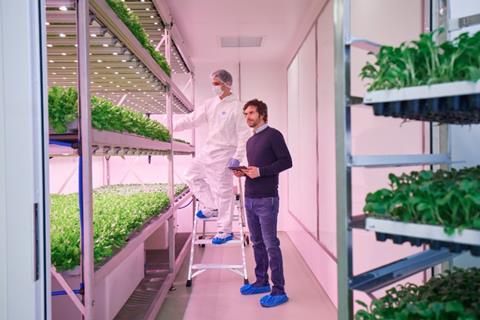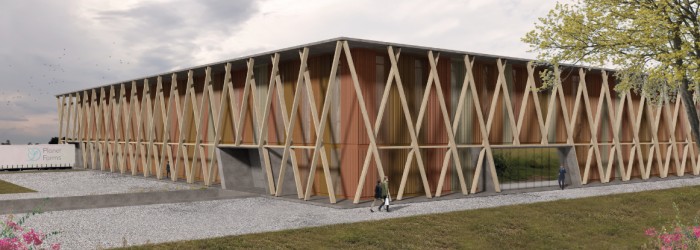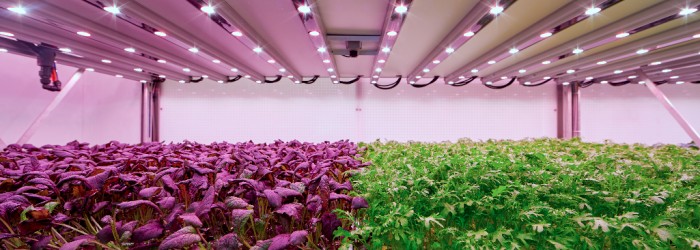
Produce more food, of better quality, using fewer resources. Luca Travaglini and Daniele Benatoff’s message to the Triennale exhibition in Milan was crystal clear: their start-up company Planet Farms is planning to build Europe’s largest and most advanced vertical farm, then establish similar projects in other countries around the world.
Work on the new centre begins this month and is due for completion in spring 2020. Located in Cavenago, halfway between Milan and Bergamo, the farm will eventually extend across 9,000m2 and supply 40,000 packs of produce per day. Inside, an innovative growing process from seed to packaged product is set to turn out zero-residue fresh produce that will impress in terms of their taste, long shelf-life and high level of sustainability.
“Vertical farming is to agriculture what Formula 1 is to cars,” say Travaglini, an apt description given the centre is just a few minutes’ drive from Monza’s world-famous race track. Planet Farms will employ state-of-the-art technology to grow babyleaf salads, basil and other aromatic herbs in a completely controlled environment situated right at the point of sale, 365 days a year. A capillary system of sensors allows the entire production process to be monitored constantly and, because the entire process is automated, Planet Farms says the consumer will be the first to touch what is a completely fresh product. Each plant will grow from a traditional seed in pure air and water, without the need for pesticides, with water usage minimised.
The new structure could be just the start as far as Planet Farms’ ambitious global development and growth plan is concerned. In fact, it aims to make Lombardy a vertical farming capital by exporting its model throughout the world, as co-founder Benatoff confirms: “The Cavenago plant represents the starting point on a path that will take us all over the world, a project that speaks Italian and that will soon see new concrete applications both in Italy and abroad.”

As with any F1 team, lots of other specialists are involved behind the scenes, including architect Studio Dordoni, lighting provider Signify, Travaglini FarmTech, WoodBeton, Sirti, 255, Repower and Netafim. Travaglini, which has years of experience in food production, is helping to plan and construct the farm’s air conditioning systems – with a focus on energy efficiency – and its clean packing rooms, where the aim is to minimise the risk of contamination from outside. Philips spin-off Signify, meanwhile, previously worked with Planet Farms on its research laboratory and is supplying Dynamic Philips GreenPower LEDs that can be fine-tuned to every type of vegetable.
“From 2020, the Cavenago facility will produce 800 tonnes of salads and aromatic herbs a year, which is equal to 40,000 packs per day,” comments Luca Travaglini. “The process, which is completely automated and checked, goes all the way from seed to end product. Air, water, light and soil, these are all variables that can be controlled: we will be the first to use clean rooms to control the air; the water will be sterilised and integrated only with mineral salts, plus we will use 97 per cent less compared with traditional agriculture; the lighting will be high-efficiency LEDs that use only the spectrum of light needed by the plant; and the soil will be substituted by organic substrates designed specifically for each crop.”
The advantages of such a system are clear, Travaglini adds. No longer constrained by weather conditions in the outside world, Planet Farms can in theory grow any product wherever there is consumer demand. “We can even rediscover ancient flavours using seeds that can no longer be used in traditional agriculture,” he suggests. “A few hours after packing, we will deliver a product that is healthy because it is rich in vitamins and antioxidants, and free of pesticides that scare today's consumer. It will also be a taste explosion, which is the paradox of vertical farming: we are rediscovering the real flavours that we no longer find in our dishes. For us, this was the primary goal and our biggest challenge.”
The result, it would seem, is that the end consumer will be the first to touch that chemical-free, crunchy, tasty salad, without needing to wash it before eating. But for Travaglini, vertical farming should not be seen as a replacement for older methods of production. “Our research and innovations can then be transferred to traditional agriculture,” he says. “We cannot and do not intend to replace it.”
This article is translated from the original Italian article, which can be found on the Fruitbook Magazine website.




